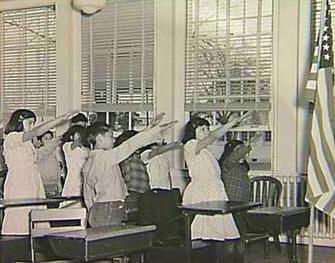TIME TO UPDATE THE PLEDGE OF ALLEGIANCE
By Rev. Zechariah Isaiah Newton, guest columnist
Since it was first written by the Reverend Francis Bellamy
in 1892, the Pledge Of Allegiance has been a great way for good Americans to
show their devotion to this blessed nation. He wrote it to commemorate the four
hundredth anniversary of Columbus' discovery, which made our nation's founding
possible. The Pledge has also been a highly effective tool for weeding out
undesirables. The original wording was I pledge allegiance to my Flag and the
Republic for which it stands, one nation, indivisible, with liberty and justice
for all. This simple and clear loyalty oath was enough to weed out unrepentant confederates who
would divide the country again, as they believed in a voluntary confederation of
sovereign states that could secede if they so chose, not one nation,
indivisible. At some point, "and the Republic" was revised to "and to the
Republic" for clarity.
The Pledge was promoted by groups like The American Legion
and the Daughters of the American Revolution until it became popular, but some
saw that further change was needed. In 1923 at the National Flag Conference, it
was pointed out again and again that immigrants could be pledging allegiance to
the flags of their old country, not the Stars and Stripes, so the wording was
changed from "My Flag" to "The Flag of the United States". That was sure to trip
up any immigrants who weren't really loyal to this nation. A year later, the
words "of America" were added for clarity.
On June 22 1942, Congress officially recognized the pledge
of allegiance for the first time, with this wording: I pledge allegiance to
the flag of the United States of America, and to the republic for which it
stands, one nation indivisible, with liberty and justice for all. Finally
our country had its official loyalty oath.
 During
World War II, another change was required. We noticed that The Bellamy Salute,
done when reciting the pledge, looked just like the one Nazis were doing in
Germany, so we stopped doing it. Instead, just putting our right hand over our
hearts became the rule. After the war, another change to the pledge became
necessary.
During
World War II, another change was required. We noticed that The Bellamy Salute,
done when reciting the pledge, looked just like the one Nazis were doing in
Germany, so we stopped doing it. Instead, just putting our right hand over our
hearts became the rule. After the war, another change to the pledge became
necessary.
Communism, specifically the godless Soviet Union's
communism, became a problem after the war. The reds could be anywhere, and we
had to weed them out. From hearings in Congress to barring the reds from
Hollywood, to putting "In God We Trust" on our money, we did whatever we could. Again, the Pledge came into play as a way
to weed out undesirables. On June 14, 1954 Congress added the words "Under God".
Surely, a godless communist would balk at saying these words, and his refusal
would out him as a Soviet sponsored subversive. This wording served us well
until recently.
On September 11, 2001, it became clear who our new enemy
was: The Muslim Arab terrorist. It is now time to revise the pledge again to deal
with them. A Muslim terrorist can say "One Nation Under God" without batting an
eye, because to him, God means Allah. We need to make it clear that all good
Americans pray to Jesus. Here is the new wording we need as soon as possible:
I pledge allegiance to the flag of the United States of America, and to the
republic for which it stands, one nation under Christ, indivisible, with liberty
and justice for all.
Surely, a Muslim terrorist hiding in our midst will balk
when asked to pledge allegiance to "One Nation Under Christ." We will be able to
confidently know who is a Muslim terrorist by this refusal, and can then deal
with them appropriately.
 During
World War II, another change was required. We noticed that The Bellamy Salute,
done when reciting the pledge, looked just like the one Nazis were doing in
Germany, so we stopped doing it. Instead, just putting our right hand over our
hearts became the rule. After the war, another change to the pledge became
necessary.
During
World War II, another change was required. We noticed that The Bellamy Salute,
done when reciting the pledge, looked just like the one Nazis were doing in
Germany, so we stopped doing it. Instead, just putting our right hand over our
hearts became the rule. After the war, another change to the pledge became
necessary.